Unit 3 Our Colorful School Life Preparing for the Topic Function课件 (共21张PPT)仁爱科普版(2024)七年级上册
文档属性
| 名称 | Unit 3 Our Colorful School Life Preparing for the Topic Function课件 (共21张PPT)仁爱科普版(2024)七年级上册 |  | |
| 格式 | pptx | ||
| 文件大小 | 8.9MB | ||
| 资源类型 | 教案 | ||
| 版本资源 | 仁爱科普版 | ||
| 科目 | 英语 | ||
| 更新时间 | 2024-10-30 08:48:33 | ||
图片预览

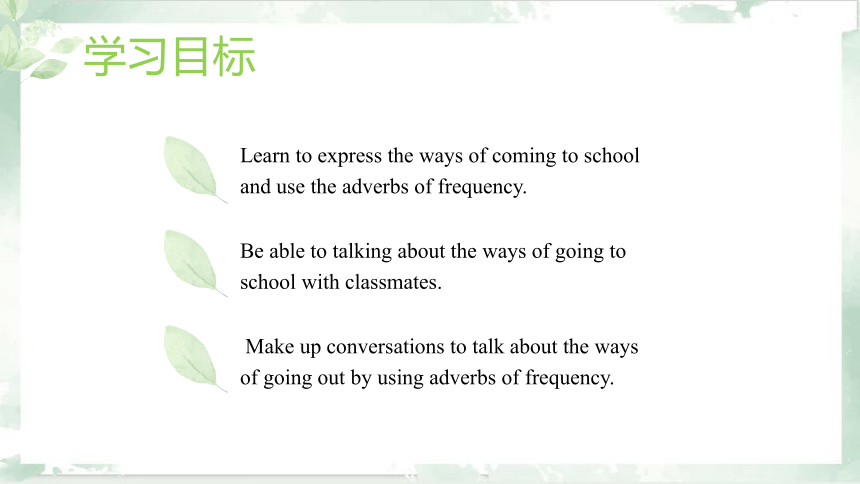
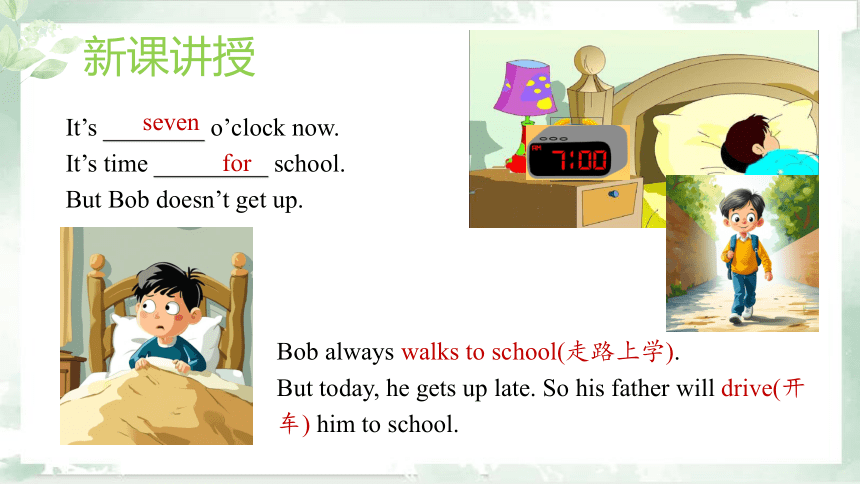
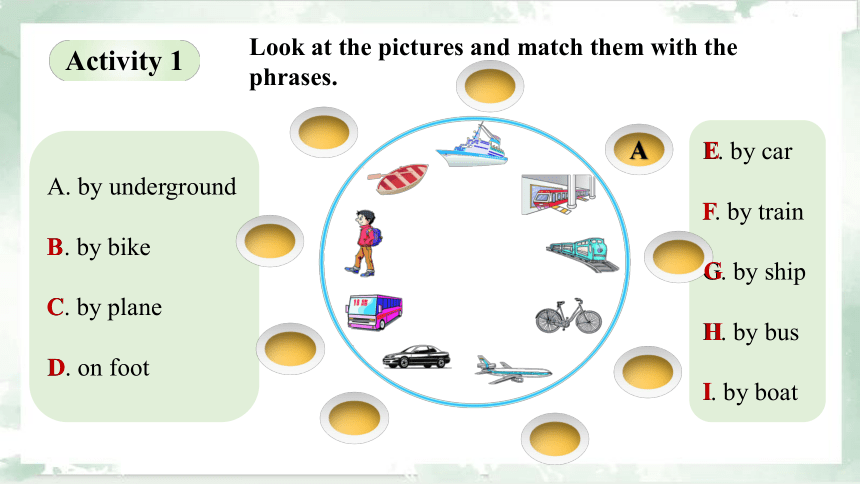
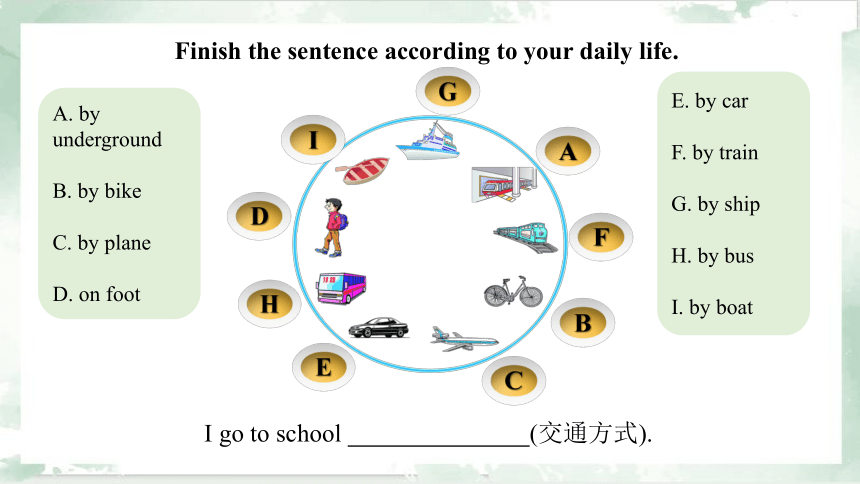
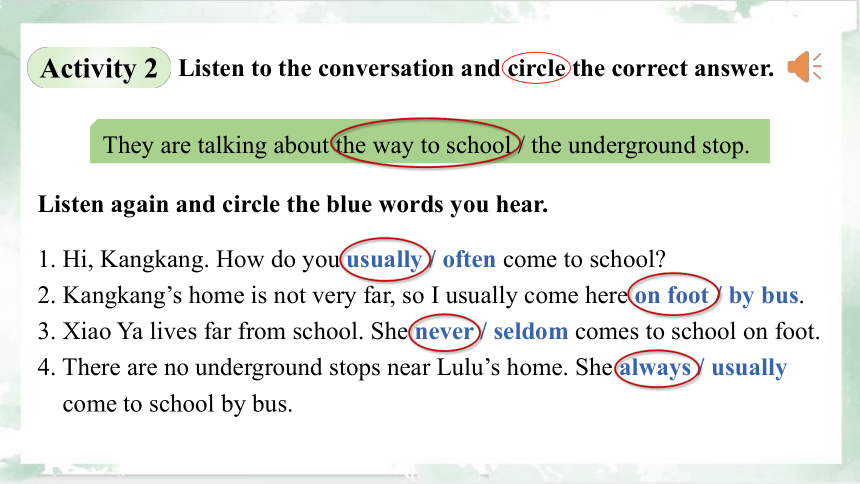
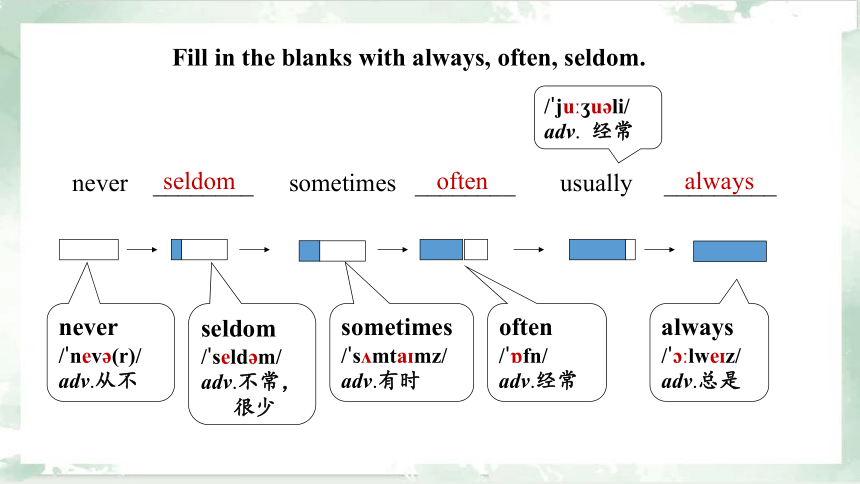
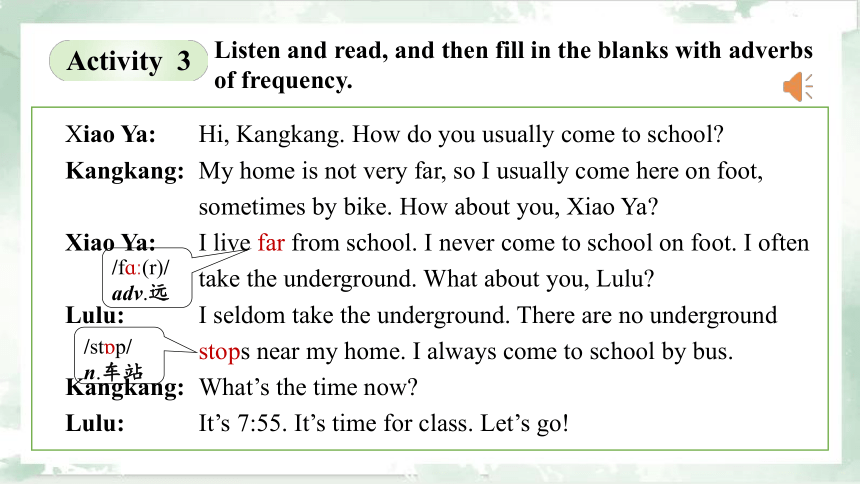
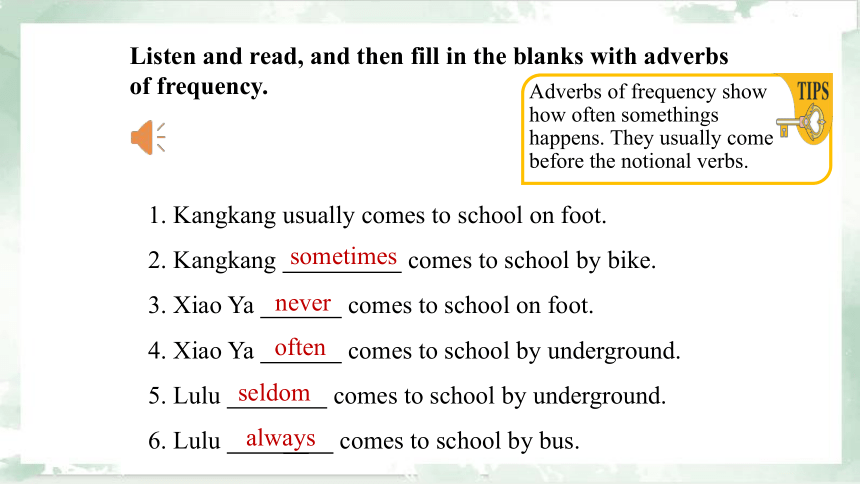
文档简介
(共21张PPT)
Function
Unit 3
Our Colorful School Life
学习目标
Learn to express the ways of coming to school and use the adverbs of frequency.
Be able to talking about the ways of going to school with classmates.
Make up conversations to talk about the ways of going out by using adverbs of frequency.
It’s ________ o’clock now.
It’s time _________ school.
But Bob doesn’t get up.
seven
for
Bob always walks to school(走路上学).
But today, he gets up late. So his father will drive(开车) him to school.
新课讲授
Look at the pictures and match them with the phrases.
A. by underground
B. by bike
C. by plane
D. on foot
E. by car
F. by train
G. by ship
H. by bus
I. by boat
A
B
C
D
E
F
G
H
I
Activity 1
Finish the sentence according to your daily life.
I
G
A
D
H
E
C
B
F
A. by underground
B. by bike
C. by plane
D. on foot
E. by car
F. by train
G. by ship
H. by bus
I. by boat
I go to school (交通方式).
Listen to the conversation and circle the correct answer.
They are talking about the way to school / the underground stop.
1. Hi, Kangkang. How do you usually / often come to school
2. Kangkang’s home is not very far, so I usually come here on foot / by bus.
3. Xiao Ya lives far from school. She never / seldom comes to school on foot.
4. There are no underground stops near Lulu’s home. She always / usually
come to school by bus.
Listen again and circle the blue words you hear.
Activity 2
Fill in the blanks with always, often, seldom.
never ________
sometimes ________
usually _________
seldom
often
always
never
/'nev (r)/
adv.从不
seldom
/'seld m/
adv.不常,
很少
sometimes
/'s mta mz/
adv.有时
often
/' fn/
adv.经常
always
/' lwe z/
adv.总是
/'ju u li/
adv. 经常
Listen and read, and then fill in the blanks with adverbs of frequency.
Xiao Ya:
Kangkang:
Xiao Ya:
Lulu:
Kangkang:
Lulu:
Hi, Kangkang. How do you usually come to school
My home is not very far, so I usually come here on foot, sometimes by bike. How about you, Xiao Ya
I live far from school. I never come to school on foot. I often take the underground. What about you, Lulu
I seldom take the underground. There are no underground stops near my home. I always come to school by bus.
What’s the time now
It’s 7:55. It’s time for class. Let’s go!
/fɑ (r)/
adv.远
/st p/
n.车站
Activity 3
Listen and read, and then fill in the blanks with adverbs of frequency.
1. Kangkang usually comes to school on foot.
2. Kangkang comes to school by bike.
3. Xiao Ya comes to school on foot.
4. Xiao Ya comes to school by underground.
5. Lulu comes to school by underground.
6. Lulu __ comes to school by bus.
sometimes
never
seldom
often
always
Adverbs of frequency show how often somethings happens. They usually come before the notional verbs.
Read again and match the names with their ways of coming to school.
Kangkang
Xiao Ya
Lulu
Talk about how you come to school by using adverbs of frequency.
Group work
For example:
A: I often come to school on foot.
B: I never come to school by bus.
C: My father always goes to work by subway.
D: He seldom goes to work by train.
E: Sometimes I come to school by bike.
Activity 4
1.They are talking about the way of going to school/ the underground stop.
他们正在讨论去学校/地铁站的方式。
(教材P40)
1. 1) talk about 意为“谈论,讨论”。
E.g. Let's talk about our favorite sports.
让我们来讨论我们最喜欢的运动吧。
2) the way of doing sth. 意为“做某事的方式/方法”,
相当于 the way to do sth.。
E.g. Kangkang is talking about the way of _______
(go) hiking with Linging.
康康正在和玲玲讨论去远足的方式。
3) underground stop 意为“地铁站”。
stop 在这里作名词,意为“车站”。
E.g. There is a bus stop near our school.
我们学校附近有一个公交车站。
|拓展: stop还可作动词,意为“停下;阻止;停止”。
going
Language points
2.—How do you usually come to school 你通常是怎样去学校的?
(教材P40)
2. 1)此句中的how用来询问交通方式。
E.g. —How does he usually go to the park
他通常怎样去公园?
—He usually goes to the park by bike.
他通常骑单车去公园。
2) come to school 意为“来上学”,这时在
school之前不能加a、an 或 the等词。
类似的短语有go to school。
E.g. She goes to school by underground.
她坐地铁去上学。
2.—My home is not very far, so I usually come here on foot, sometimes by bike. 我家不远,所以我通常步行来学校,有时候骑自行车。
(教材P40)
2.
3) on foot意为“步行、走路”,可与“walk”互换。
E.g. She often goes home on foot.
= he often walks home. 她经常步行回家。
4) by bike意为“骑自行车”。
“by+表示交通工具的单数名词”,是一种常见
的表示乘坐某种交通工具的介词短语。
常见的此类短语还有:by car/train/bus等。
注意:此处by后不能加a/an/the, 也不能加one's、this、that等限定词。
“乘”法不同 take+a/an/the+表示交通工具的单数名词
by+表示交通工具的单数名词
in/on+a/an/the/this/one's+表示交通工具的单数名词
ride/drive+a/the/形容词性物主代词+表示交通工具的单数名词
E.g. take a bus 乘公交车 take a train 乘火车 take the underground 坐地铁
by plane 乘飞机 by boat 坐船 by car 坐小汽车
on his bike 骑自行车 on the bus/train 乘公共汽车/火车
ride a bike 骑自行车 drive a car 开车
注意:“步行”可表达为“on foot”(介词短语)和“walk”(动词,可做谓语)。
拓展:
3.—How about you, Xiao Ya
你呢,肖雅?
—I live far from school.
我住得离学校远。
(教材P40)
3. 1)“How about+sb. ”, 这一类句型用来询问
与上文类似的情况。可与what about互换。
拓展: “How about+名词/代词/动名词?”,也可
表示说话人的建议,用来征询对方的意见。
其答语一般为“Good idea./Sure./Of course.”等;
否定回答一般为“I'm sorry, but...”。
E.g —How/What about walking the dog
去遛狗怎么样? —Good idea! 好主意!
2) far from+地点,意为“离.......远”,
相当于 far away from。
E.g The bus stop is far from my home.
4.I often take the underground.
我经常乘地铁。
(教材P40)
4. take the underground 意为“乘地铁”,相当于
by underground/subway。前者为动词短语,
在句中作谓语;后者为介词短语,在句中常
作状语,常位于句末。
E.g I usually take the underground to school.
= I usually go to school by underground.
我通常坐地铁去学校。
5.There are no underground stops near my home.
我家附近没有地铁站。
(教材P40)
5. “There are no+可数名词复数”可与
“There are not any+可数名词复数”互换。
此时no是形容词,作定语。
E.g. There are no students in the room. 房间里没有学生
= There are not any students in the room.
拓展: “There is no+可数名词单数”可与
“There is not a(n)+可数名词单数”互换。
E.g There is no book on the table.
= There is not a book on the table. 桌面上没有一本书。
We learn:
1. some words: underground, seldom, usually
2. some phrases: on foot/ by bike/car/bus/train/subway/plane/boat/ take a bus
/take the subway
3. some sentences:
How do you usually come to school
I usually come to school by subway.
We can:
1. talk about the means of transportation. e.g. I often go to school by bike/bus.
2. use adverbs of Frequency correctly.
e.g. never, seldom, sometimes, often, usually, always
课堂总结
I. 选择题。
1. I can’t ride a bike, so I ________take a bike to school.
A. never B. always C. often D. sometimes
2. —When ________ your geography class begin(开始)
—It’s at 3:15.
A. is B. are C. do D. does
3. How about ________ a music club
A. to join B. to joining C. join D. joining
4. My home is very near, so I ________ walk to school
A. seldom B. never C. usually D. sometimes
A
D
D
C
当堂检测
II. 按要求完成句子。
1. There is not any water in the bottle. (改为同义句)
There is ________ ________ in the bottle.
2. Tom often rides a bike to school. (改为同义句)
Tom often goes to school _______ _______.
3. There are some balls in the desk.(改为否定句)
There ________ _________ balls in the desk.
4. 放学后去图书馆怎么样? (完成译句)
_______ _______ _______ to the library after school
5. 琳琳经常步行回家。。 (完成译句)
Linlin often _______ _______ on foot = Linlin often ______ home.
no water
by bike
aren’t any
What/How about going
goes home
walks
Function
Unit 3
Our Colorful School Life
学习目标
Learn to express the ways of coming to school and use the adverbs of frequency.
Be able to talking about the ways of going to school with classmates.
Make up conversations to talk about the ways of going out by using adverbs of frequency.
It’s ________ o’clock now.
It’s time _________ school.
But Bob doesn’t get up.
seven
for
Bob always walks to school(走路上学).
But today, he gets up late. So his father will drive(开车) him to school.
新课讲授
Look at the pictures and match them with the phrases.
A. by underground
B. by bike
C. by plane
D. on foot
E. by car
F. by train
G. by ship
H. by bus
I. by boat
A
B
C
D
E
F
G
H
I
Activity 1
Finish the sentence according to your daily life.
I
G
A
D
H
E
C
B
F
A. by underground
B. by bike
C. by plane
D. on foot
E. by car
F. by train
G. by ship
H. by bus
I. by boat
I go to school (交通方式).
Listen to the conversation and circle the correct answer.
They are talking about the way to school / the underground stop.
1. Hi, Kangkang. How do you usually / often come to school
2. Kangkang’s home is not very far, so I usually come here on foot / by bus.
3. Xiao Ya lives far from school. She never / seldom comes to school on foot.
4. There are no underground stops near Lulu’s home. She always / usually
come to school by bus.
Listen again and circle the blue words you hear.
Activity 2
Fill in the blanks with always, often, seldom.
never ________
sometimes ________
usually _________
seldom
often
always
never
/'nev (r)/
adv.从不
seldom
/'seld m/
adv.不常,
很少
sometimes
/'s mta mz/
adv.有时
often
/' fn/
adv.经常
always
/' lwe z/
adv.总是
/'ju u li/
adv. 经常
Listen and read, and then fill in the blanks with adverbs of frequency.
Xiao Ya:
Kangkang:
Xiao Ya:
Lulu:
Kangkang:
Lulu:
Hi, Kangkang. How do you usually come to school
My home is not very far, so I usually come here on foot, sometimes by bike. How about you, Xiao Ya
I live far from school. I never come to school on foot. I often take the underground. What about you, Lulu
I seldom take the underground. There are no underground stops near my home. I always come to school by bus.
What’s the time now
It’s 7:55. It’s time for class. Let’s go!
/fɑ (r)/
adv.远
/st p/
n.车站
Activity 3
Listen and read, and then fill in the blanks with adverbs of frequency.
1. Kangkang usually comes to school on foot.
2. Kangkang comes to school by bike.
3. Xiao Ya comes to school on foot.
4. Xiao Ya comes to school by underground.
5. Lulu comes to school by underground.
6. Lulu __ comes to school by bus.
sometimes
never
seldom
often
always
Adverbs of frequency show how often somethings happens. They usually come before the notional verbs.
Read again and match the names with their ways of coming to school.
Kangkang
Xiao Ya
Lulu
Talk about how you come to school by using adverbs of frequency.
Group work
For example:
A: I often come to school on foot.
B: I never come to school by bus.
C: My father always goes to work by subway.
D: He seldom goes to work by train.
E: Sometimes I come to school by bike.
Activity 4
1.They are talking about the way of going to school/ the underground stop.
他们正在讨论去学校/地铁站的方式。
(教材P40)
1. 1) talk about 意为“谈论,讨论”。
E.g. Let's talk about our favorite sports.
让我们来讨论我们最喜欢的运动吧。
2) the way of doing sth. 意为“做某事的方式/方法”,
相当于 the way to do sth.。
E.g. Kangkang is talking about the way of _______
(go) hiking with Linging.
康康正在和玲玲讨论去远足的方式。
3) underground stop 意为“地铁站”。
stop 在这里作名词,意为“车站”。
E.g. There is a bus stop near our school.
我们学校附近有一个公交车站。
|拓展: stop还可作动词,意为“停下;阻止;停止”。
going
Language points
2.—How do you usually come to school 你通常是怎样去学校的?
(教材P40)
2. 1)此句中的how用来询问交通方式。
E.g. —How does he usually go to the park
他通常怎样去公园?
—He usually goes to the park by bike.
他通常骑单车去公园。
2) come to school 意为“来上学”,这时在
school之前不能加a、an 或 the等词。
类似的短语有go to school。
E.g. She goes to school by underground.
她坐地铁去上学。
2.—My home is not very far, so I usually come here on foot, sometimes by bike. 我家不远,所以我通常步行来学校,有时候骑自行车。
(教材P40)
2.
3) on foot意为“步行、走路”,可与“walk”互换。
E.g. She often goes home on foot.
= he often walks home. 她经常步行回家。
4) by bike意为“骑自行车”。
“by+表示交通工具的单数名词”,是一种常见
的表示乘坐某种交通工具的介词短语。
常见的此类短语还有:by car/train/bus等。
注意:此处by后不能加a/an/the, 也不能加one's、this、that等限定词。
“乘”法不同 take+a/an/the+表示交通工具的单数名词
by+表示交通工具的单数名词
in/on+a/an/the/this/one's+表示交通工具的单数名词
ride/drive+a/the/形容词性物主代词+表示交通工具的单数名词
E.g. take a bus 乘公交车 take a train 乘火车 take the underground 坐地铁
by plane 乘飞机 by boat 坐船 by car 坐小汽车
on his bike 骑自行车 on the bus/train 乘公共汽车/火车
ride a bike 骑自行车 drive a car 开车
注意:“步行”可表达为“on foot”(介词短语)和“walk”(动词,可做谓语)。
拓展:
3.—How about you, Xiao Ya
你呢,肖雅?
—I live far from school.
我住得离学校远。
(教材P40)
3. 1)“How about+sb. ”, 这一类句型用来询问
与上文类似的情况。可与what about互换。
拓展: “How about+名词/代词/动名词?”,也可
表示说话人的建议,用来征询对方的意见。
其答语一般为“Good idea./Sure./Of course.”等;
否定回答一般为“I'm sorry, but...”。
E.g —How/What about walking the dog
去遛狗怎么样? —Good idea! 好主意!
2) far from+地点,意为“离.......远”,
相当于 far away from。
E.g The bus stop is far from my home.
4.I often take the underground.
我经常乘地铁。
(教材P40)
4. take the underground 意为“乘地铁”,相当于
by underground/subway。前者为动词短语,
在句中作谓语;后者为介词短语,在句中常
作状语,常位于句末。
E.g I usually take the underground to school.
= I usually go to school by underground.
我通常坐地铁去学校。
5.There are no underground stops near my home.
我家附近没有地铁站。
(教材P40)
5. “There are no+可数名词复数”可与
“There are not any+可数名词复数”互换。
此时no是形容词,作定语。
E.g. There are no students in the room. 房间里没有学生
= There are not any students in the room.
拓展: “There is no+可数名词单数”可与
“There is not a(n)+可数名词单数”互换。
E.g There is no book on the table.
= There is not a book on the table. 桌面上没有一本书。
We learn:
1. some words: underground, seldom, usually
2. some phrases: on foot/ by bike/car/bus/train/subway/plane/boat/ take a bus
/take the subway
3. some sentences:
How do you usually come to school
I usually come to school by subway.
We can:
1. talk about the means of transportation. e.g. I often go to school by bike/bus.
2. use adverbs of Frequency correctly.
e.g. never, seldom, sometimes, often, usually, always
课堂总结
I. 选择题。
1. I can’t ride a bike, so I ________take a bike to school.
A. never B. always C. often D. sometimes
2. —When ________ your geography class begin(开始)
—It’s at 3:15.
A. is B. are C. do D. does
3. How about ________ a music club
A. to join B. to joining C. join D. joining
4. My home is very near, so I ________ walk to school
A. seldom B. never C. usually D. sometimes
A
D
D
C
当堂检测
II. 按要求完成句子。
1. There is not any water in the bottle. (改为同义句)
There is ________ ________ in the bottle.
2. Tom often rides a bike to school. (改为同义句)
Tom often goes to school _______ _______.
3. There are some balls in the desk.(改为否定句)
There ________ _________ balls in the desk.
4. 放学后去图书馆怎么样? (完成译句)
_______ _______ _______ to the library after school
5. 琳琳经常步行回家。。 (完成译句)
Linlin often _______ _______ on foot = Linlin often ______ home.
no water
by bike
aren’t any
What/How about going
goes home
walks
同课章节目录
